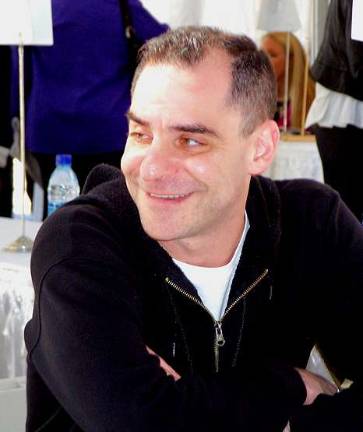The David Rakoff Canon: Works You Should Know by the "This American Life" Master

How does one do-notoriously pessimistic and humorously insightful essayist- David Rakoff's work justice? How does one begin to fumble for the words to embody his literary range? Rakoff, who just passed away at the age of 47, wrote and spoke in a way that so remarkably reflected our uncertain collective reality-in his profundity, in his candidness, and in analogies so apt and relevant they surely required years of careful research into our human minutiae. In Rakoff's essays, there's deep pain, there's sardonic humor, there's desperate hatred, there's even rhyme (sometimes). In reading Rakoff's essays, you find yourself wondering over and over, how did he know? How did he so scrupulously pinpoint the intricacies of the human psyche?Below are just a few surface-scratching must-read hits from Rakoff's prolific career: In "The Waiting," an essay which appeared last year in the New York Times Magazine, Rakoff describes the process of battling a long illness, while the greatest struggle at times seems resisting the urge to overanalyze his caregivers' words and demeanors as significant, as a predictor of outcomes. Rakoff writes, of the encouraging and empathetic feedback we are programmed to deliver to one another, "...as an anticipatory tool, it does not soften the blow, indeed it does the opposite. It leaves you exposed, like grabbing onto the trunk of a tree for support in a storm only to find the wood soaked through and punky and coming apart in your hands." Undeniably, anyone who is human comprehends the feeling Rakoff captures, remembers the exact moment even, when plumbing the depths of desperation he loaded undue significance on the words of another. Anyone who is human recalls the moment in which he became-however fleetingly-superstitious. In the essay "Stiff as a Board, Light as a Feather," which Rakoff recited on This American Life earlier this year, he describes the experience of having a nerve in his left arm severed, causing him to have the occasional "gesture of someone who danced...which is very different," he says, "from having been a dancer." During the show, Rakoff elucidates the processes our bodies undergo, which we rarely question until they manifest as physical abnormalities. "There are some questions in life the very speaking of which are their own undoing," he explains, for instance, "is this real?" It is the question, ultimately, which awakens him to the reality of his situation. Rakoff manages to take his ravaging sickness, and not only approach it with objectivity, but extrapolate to some wider, more philosophical meaning about the nature of consciousness. Whether or not he fully intends to, Rakoff can scarcely avoid offering us an outstretched hand, a gateway toward common identification. It's never merely his experience, but what his tells us about all our own. In 1996, on This American Life, Rakoff described his time spent dressed as Sigmund Freud in Barney's department store Christmas window display in "Christmas Freud." A version of the essay also appears in his collection, Fraud. "In the window I fantasize about starting an entire Christmas Freud movement," says Rakoff, waxing on the complex relationship between psychoanalysis, spirituality and commerce across generations. "In department stores across America, people leave display window couches snifflingly and meaningfully whispering, 'Thank you, Christmas Freud,'" he writes. Not afraid to go over the top, Rakoff undauntedly appropriated the situations which befell him with the mastery and dexterity of a world-class storyteller. Rakoff writes in "All The Time We Have," in his collection Half-Empty, of the death of his therapist of ten years (Rakoff was something of a self-professed therapy junkie over the years). The tribute is poignant and heart-wrenching, as he explores the complex relationship with a man who, in all his human vulnerability, ultimately required Rakoff's approval just as badly. Rakoff writes so acutely of the push-and-pull struggle for approval, the hunger that reveals itself to be quite insatiable, the games we humans play, the waters we test, only to discover we are insatiable. Rakoff writes of this challenge we do not want to win because we fear its results: "this confirmation that you have triumphed again and managed to gull yet another mark, except this time it was the one person you'd hoped might be immune to your ever-creakier, puddle-shallow, sideshow-barker variation on "adorable," even though you'd been launching this campaign weekly with single-minded concentration from day one." Finally, but by no means least or remotely comprehensively, Rakoff writes of attending a Tibetan Buddhist retreat led by Steven Seagal in an essay also appearing in Fraud. Portraying this outlandish, over-the-top New Age-y, self-help ritual, Rakoff is at his most poetic: "Twenty years ago we would have been readers of Robert Persig. Now we own well-thumbed copies of The Jew in the Lotus. We've done yoga. We've been lactose intolerant." His fresh, concise commentary, which easily disavows the usual stereotypes-while marrying the expected with the uncanny and cynical-is so slick, so layered, there's something new and potent to unearth on every read. Rakoff published three books of essays and contributed widely to anthologies, newspapers and magazines. He was a regular on the radio show This American Life. All Rakoff's contributions to This American Life can be found [here](http://www.thisamericanlife.org/contributors/david-rakoff).